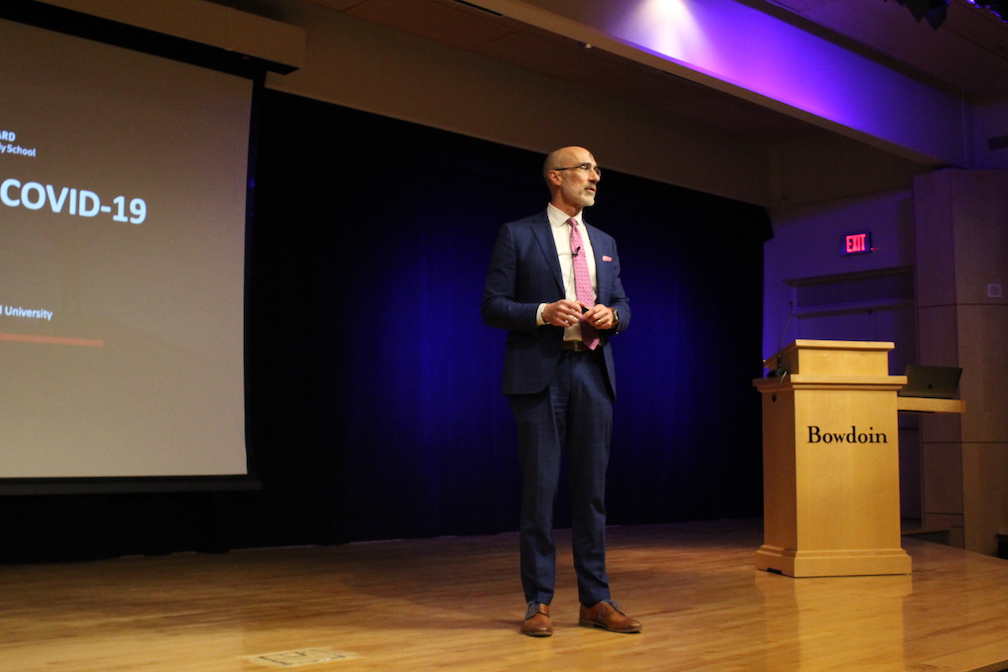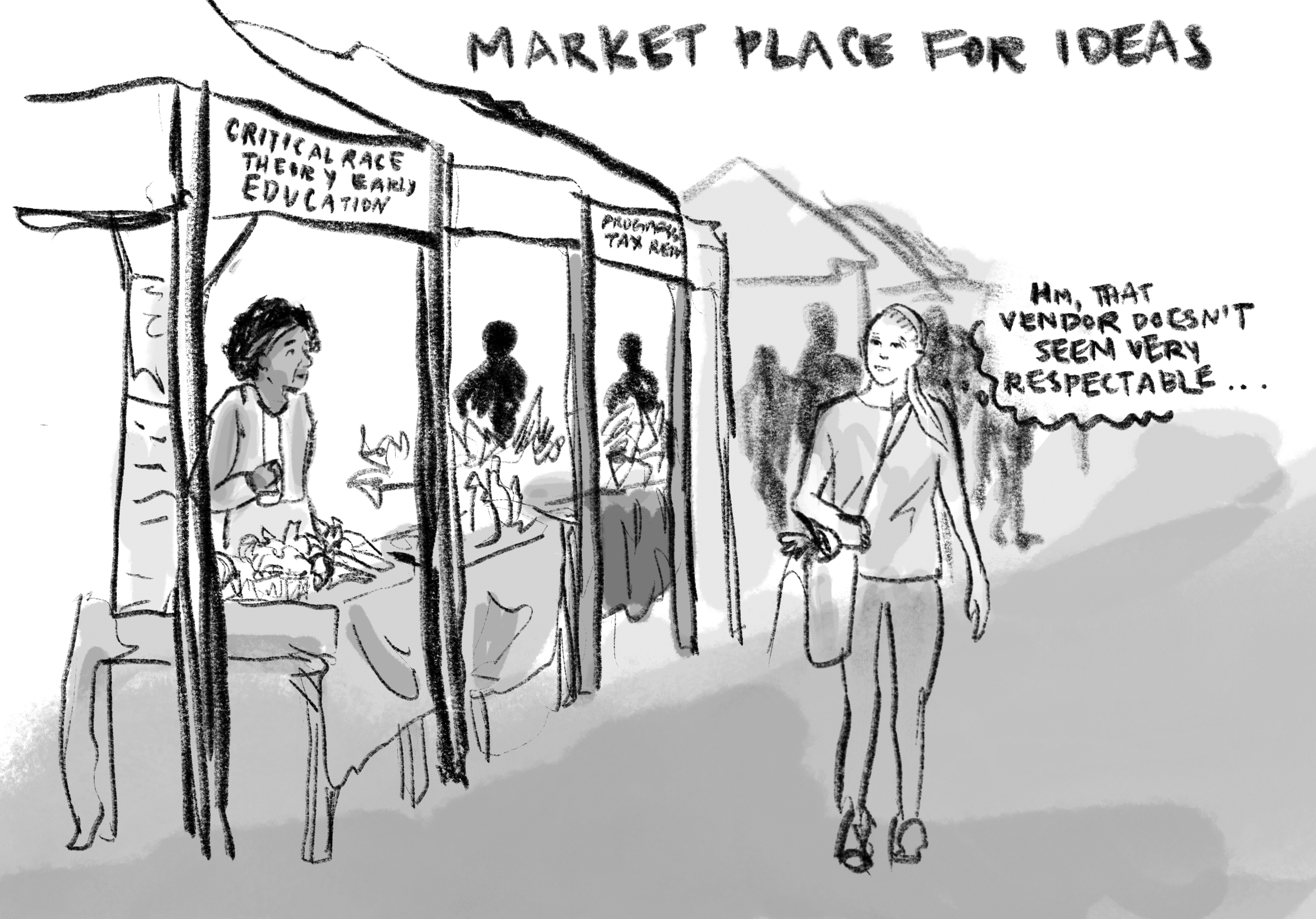‘It’s very hard to debate anything these days’: reopening the conversation over political diversity and free speech at Bowdoin
April 22, 2022
In early March, Arthur Brooks, a professor at Harvard Business School and the Harvard Kennedy School of Government, spent three days on campus as the College’s Joseph McKeen Visiting Fellow for the second time. His visit brought an ongoing national debate surrounding freedom of speech on college campuses back to Bowdoin’s classrooms.
Brooks, who served as the president of the American Enterprise Institute (AEI)—a conservative-leaning think tank—from 2009 to 2019, rejects liberal views promoting welfare-based approaches to addressing poverty in favor of policies such as the institution of a negative income tax and lower minimum wages.  Mary Henthorn
Mary Henthorn
However, instead of discussing the political ideals upon which he made his career, Brooks’ recent talk focused on the pursuit of happiness and lessons learned from the Covid-19 pandemic. Both the topics and format of his events left many community members disappointed that they were unable to engage with Brooks on political issues during his most recent visit due to narrow constraints placed on the topic and format of the events.
Colter Adams ’24, leader of the Bowdoin Democrats, was frustrated by Brooks’ avoidance of more explicitly political subjects.
“It’s really valuable to have different perspectives on campus, and I think [Brooks] completely missed an opportunity to provide a more conservative perspective on current events and talk about the conservative viewpoint when it comes to the common good,” he said.
Associate Professor of Government and Asian Studies Henry Laurence voiced concern over the way in which speakers, not just Brooks, engage with campus.
“I think [speakers who come to campus] need to come to be challenged so that we can have informed discussion [and] proper disagreements,” he said. “What I have not liked about some of the speaker series [in the past] are not the speakers themselves, but the lecture and question-answer format—it’s a very bad way to engage with peoples’ arguments.”
Laurence was approached by the McKeen Center for the Common Good in November 2021 and was asked if he wanted Brooks to visit his classes. He agreed and assigned his classes Brooks’ book, The Road to Freedom, which compares the impact of American and European social welfare programs on poverty.
In January, however, Laurence received notice that Brooks would not be visiting his courses after all.
“I was really looking forward to sitting down with him for an hour and being able to talk through some of what he said,” Laurence said. “It seemed like a great thing that would have been really good for the students, who were all very disappointed that it didn’t happen.”
Associate Professor of Economics Erik Nelson echoed Laurence’s frustrations about the format of speakers’ visits to campus. He suggested that instead of holding large events that involve little audience engagement, speakers should discuss their work with students and professors in several courses from the range of fields that apply to their work.
“[Speakers] probably would end up engaging with more students that way than they would by doing some big event in Kresge.”
Laurence proposed a broader vision of speaker visits and intellectual conversations more generally. He believes that these discussions take place within a “marketplace for ideas” which must be regulated by rules of honesty, integrity and respect.
“Otherwise, like a market for food, it gets polluted and poisoned, and then it’s no good for anyone,” Laurence said. “The genuine free exchange of ideas has a prerequisite quality of respect for everyone in the room. If you’re not willing to grant that respect––because you think trans people are deviants, or you think that certain races don’t belong here, or even certain genders don’t belong here––I think if that’s your attitude coming in … [yours] is not a contribution that is going to help the free flow of ideas.”
Course Content
The questions about how to effectively incorporate and engage with diverse political viewpoints raised by Brooks’ visit also emerge regularly in the classroom. Political discussions occur inside the classroom far more often than guest speakers visit campus, and professors wrestle with the issues of political diversity and free speech in their courses on a daily basis.
Gary M. Pendy Sr. Professor of Social Sciences Jean Yarbrough is among a small minority of self-identified conservative professors at the College. However, Yarbrough said that her selection of texts and interactions with students in her classes are not guided by her politics.
“In most of the courses I teach, there isn’t even a question of political viewpoint,” she said. “When I was an undergraduate, I was marching on Washington, I was in Students for a Democratic Society, so I expect that most of my students will be on the left,” Yarbrough said. “Many of them I can talk to because they’re curious.”
The content of her courses instead originates from her years of experience teaching political theory, she explained.
“I try to choose in all my courses texts that make up what I consider … to be the fundamental knowledge that undergraduates at a very selective liberal arts institution should come away knowing,” Yarbrough said.
She added that introducing students to conservative ideas is a vital part of teaching them to understand their fellow Americans.
“It seems to me to make a great deal of sense that students should be exposed to the ideas of half the country and not have them caricatured and reduced to absurdities,” Yarbrough said.
Several professors noted the value of not shielding their political beliefs, including Laurence.
“Rather than pretending [to have] some sort of fake objectivity, I believe it’s better to be honest, so that I can explain the reasons why I am persuaded by [something],” Laurence said. “The political views I have are a result of the research that I’ve done and … the values that I apply, but they’re amenable to change if I’m proved wrong, and I’m happy to be proved wrong.”
To foster such an atmosphere in his classes, Laurence assigns readings that contain diverse perspectives and raises opposing viewpoints when students make arguments from a singular ideological perspective. He has found the latter method to be particularly impactful for students.
“You should be comfortable exploring arguments that you might not think you agree with, because you might find out that you do,” he said.
Associate Professor of History David Hecht explained that while professors’ political beliefs will undoubtedly impact the content of their courses, he chooses to place minimal emphasis on politics in his classes to maintain focus on the historical aspects of events. However he also acknowledged the difficulty of this approach, especially in his courses about modern history and the history of science.
“When you get down to it, everything is political. There are people who would say I am being political when I teach climate change and present it as fact,” Hecht said. “What makes it really complicated is that claiming that something is apolitical, is, in a sense, political, because there are people in the world who disagree with me on that.”
Given that politicization is inherent in nearly every subject, some students, including the Leader of the Bowdoin College Republicans Oron Steingrub ’22, believe that having more conservative professors on campus would be beneficial.
“To the best of my knowledge, there’s only one registered Republican who is a professor on Bowdoin’s campus,” explained Steingraub. “While I think that Bowdoin has a superb academic environment, … it would be great to see more of an effort made to recruit professors who can share an alternative political lens because I think that regardless of how hard you try, your politics will always come through in every aspect of your work.”
Laurence, however, emphasized that measuring political diversity by political party registration is not an accurate indicator of the views of faculty.
“I think there are a lot of conservative views on campus among a wider group of faculty who are not Republicans because the Republican Party under Donald Trump has betrayed a lot of conservative values,” he said. “Looking at [party registration] is absolutely the wrong way to measure [political] diversity.”
Working Towards More Open Discussion
Although political ideology may be much more nuanced than party registration, several of the politically oriented groups on campus—such as the Bowdoin Democrats and the Bowdoin College Republicans—are structured along these binary lines.
Adams said that the Bowdoin Democrats is an inherently partisan organization and does not seek to act as an intermediary to conservative groups on campus. He noted, however, that his club has been working with other progressive groups on campus—such as the Bowdoin Labor Alliance—largely on issues of advocacy.
Steingraub explained that the College Republicans emphasize ideological diversity while remaining a forum for conservative thought.
“The goal of the College Republicans is to be a place that inspires ideological diversity on campus and an interesting exchange of ideas in a respectful manner,” said Steingraub. “By offering different events to our club, we encourage those who may lean further to the right than others on campus to still be able to identify with their political beliefs.”
While he believes that liberal arts colleges could do more to promote political diversity, Steingraub stressed the role Republicans must play in that effort.
“I think it’s the responsibility of conservatives as well to be more outward-looking and be more willing to … share their opinions in public,” he said.
Yarbrough, however, noted the obstacles preventing students from sharing alternative opinions. She believes there are implicit restrictions on the range of views considered acceptable for discussion outside of ideologically aligned spaces.
 Kyra Tan
Kyra Tan“These days, the only [students] who are willing to speak are people whose views …. have been vetted and are widely accepted as [the views] Bowdoin students should have,” she said. “It’s very hard to debate anything these days.”
Yarbrough noted that the Bowdoin students who attended this year’s Conservative Political Action Conference (CPAC) in Orlando, Fla., did not want to be named in an Orient article about their trip for fear that they would be ostracized by fellow community members. Much of this fear, according to her, comes from the impersonal and public nature of interactions on social media.
“[Social media] has a very powerful effect on dampening what it is that students say. Students will come to my office and tell me things, but they won’t discuss them in class,” she said. “They’re worried about how they will be regarded.”
Interim Chief Diversity Officer Benje Douglas shared Yarbrough’s position on the harms of political discussions playing out over public and often anonymous platforms.
“When you’re arguing with someone [over] an online space, maybe they don’t feel fully human—they’re two-dimensional, they’re on a screen. But when people are actually sitting across a table, or in our auditorium, or walking around campus, they’re much more than just their ideology or their political beliefs,” he said.
While the CPAC attendees chose to remain anonymous out of an abundance of caution, Steingraub said that he has found the Bowdoin community to be more open to considering various perspectives than the national narrative around political diversity on college campuses suggests.
“I’ve been pleasantly surprised by the openness of the campus to not fight back against conservatism [this year],” he said.
Douglas emphasized the importance of civility in maintaining that standard.
“When it comes to being a welcoming place, it’s really about welcoming everybody’s humanness and their humanity,” Douglas said. “And when it comes to [contesting] ideas, I think you have to do that with an eye towards understanding humanity as well.”


Comments
Before submitting a comment, please review our comment policy. Some key points from the policy: